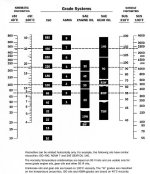You won't harm anything by adding regular engine oil in a pinch. I'm not recommending mixing different types of oils as being good practice, but the simple truth is that there aren't too many hydraulic components on any type of equipment that are brand/model specific.
Hydraulic manufacturers like Vickers, Parker, Barnes, Rexroth, etc. all supply components to tractor/equipment manufacturers. You can get a tag number off of a pump or valve assembly and look it up on the manufacturer's website. They'll list a
range of suitable fluids....not one and one only. Some stuff we have will use ATF in a system, while another piece of equipment with the same pump with be factory-filled with hydraulic oil.
If mixing a quart, (or a few quarts), of a different type of oil resulted in damage, we'd have a lot more stuff to fix than we do. If a customer breaks an easy-to-replace hose or fitting a couple of hundred miles away, (in other words, they made the call to repair it themselves), they
rarely consult the manual before adding oil back into the system.
Then there are all of the rental hydraulic
attachments we have to consider. The last guy to use the hydraulic breaker/auger/snowblower/whatever may have had it attached to his skidsteer that's full of UTF. The next guy to rent it may have a regular Bobcat filled with 10-30 engine oil. Whatever oil that sits in the attachment and hoses once it gets de-coupled isn't flushed before the unit goes out, nor is it flushed when it comes back.
Once again, not
recommending it as
good practice, but there are much more important considerations to worry about....such as keeping dirt, debris, and water out of the systems. In some
rare instances, you may come across two types of oil that may have some compatibility issue(s), but
most of the time....it's simply not a problem. It's especially not a problem if you follow the equipment manufacturer's recommendations and change out the hydraulic oil anyway at specified intervals.
As far as "flushing" a system goes, I've seen it done quite a few times by folks that are doing it via a method that's more "feel good" than it is effective. In other words, unless you plan on buying enough oil and filters to replace the entire system's volume,
and then doing the process at least a couple of times, you're spinning your wheels.


